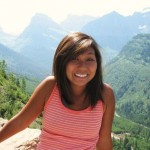 Kylie grew up in Minneapolis, Minnesota. She received in a Bachelor’s of Arts in French Language Studies and a Bachelor’s of Science in Biology from the University of St. Thomas in St. Paul, MN. More recently, she earned a Master’s of Science degree in Marine Science from the University of New England in Maine. Her research examined how river plume dynamics influence larval transport and more specifically the distribution of crab and mussel larvae. Beyond educational institutions, Kylie has gained experience working for State agencies such as the Minnesota Department of Natural Resources, interning at aquariums, and teaching science and math in K-12 public schools and college-level courses in the Caribbean. In the future, she hopes to pursue a career in marine resource management and is particularly interested in science communication, K-12 education and outreach, and conducting applicable research. Continue reading
Kylie grew up in Minneapolis, Minnesota. She received in a Bachelor’s of Arts in French Language Studies and a Bachelor’s of Science in Biology from the University of St. Thomas in St. Paul, MN. More recently, she earned a Master’s of Science degree in Marine Science from the University of New England in Maine. Her research examined how river plume dynamics influence larval transport and more specifically the distribution of crab and mussel larvae. Beyond educational institutions, Kylie has gained experience working for State agencies such as the Minnesota Department of Natural Resources, interning at aquariums, and teaching science and math in K-12 public schools and college-level courses in the Caribbean. In the future, she hopes to pursue a career in marine resource management and is particularly interested in science communication, K-12 education and outreach, and conducting applicable research. Continue reading
Category Archives: Student Research
Update on recent visiting programs!
Fall is off to a fantastic start in Educational Programs! CEI jumped back into the academic year with two amazing weeks of programming. Along for the ride were our students from Round Square, a collaborative group of 17 young adults from Canada and Massachusetts, followed by Palm Beach Day Academy of Florida.
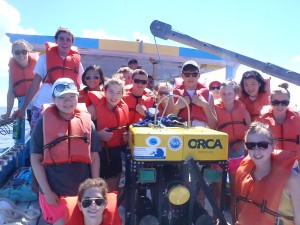
Round Square ambassadors spent time on Eleuthera before heading to the annual Round Square conference. Students focused on their “IDEALS of learning: Internationalism, Democracy, Environment, Adventure, Leadership and Service” while at CEI, and investigated the concept of what it means to live and travel well. Round Square students had the once in a lifetime opportunity of launching the Medusa with the Shark Research team, along with dissecting a lionfish, conducting shuttle box experiments, and surveying the local beaches for marine debris.
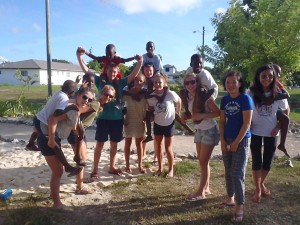
To emphasize the international element of the program, CEI organized and launched a Round Square-DCMS Plastics Seminar! The day began by pairing each Round Square student with a DCMS student, and quickly launched into round table discussions on plastics pollution and its impact on environment and our bodies. All DCMS and the Round Square students were insightful and reflective on plastics in daily life, and each left with recycled plastic jewelry to remind them to keep continue thinking about plastic’s role in our world. Continue reading
Gap Year Students Perform Shallow Water Conch Surveys
This fall the gap year team has undertaken the task of completing Fall 2013 shallow water conch surveys. Once complete this data will be a part of a larger effort to conserve this economically and culturally important species.
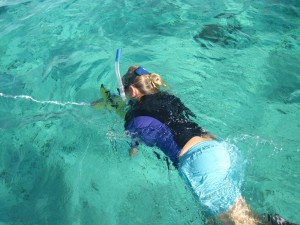 The sites we are surveying are in the Bight of Eleuthera; there are 18 sites total, and so far 10 have been completed. They involve snorkeling three transects, each 30 meters in length and 2 meters wide, and counting and measuring the conch we find. So far the juveniles are pulling through, and almost 100% of the conch found have been juveniles, demonstrating the environment still able to support the nursery for this species.
The sites we are surveying are in the Bight of Eleuthera; there are 18 sites total, and so far 10 have been completed. They involve snorkeling three transects, each 30 meters in length and 2 meters wide, and counting and measuring the conch we find. So far the juveniles are pulling through, and almost 100% of the conch found have been juveniles, demonstrating the environment still able to support the nursery for this species.
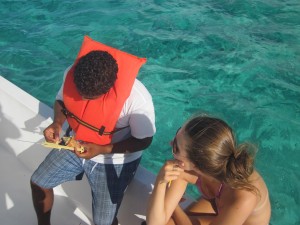 The surveys prove to be quite exciting, and we have spotted a plethora of other species while surveying (such as lemon sharks), and there are a lot of Echinoderms who share their habitat with the queen conch. During the surveys we are often fighting strong currents, dodging an array of jellyfish, and dealing with the hot sun. However, as tough as these times are we know we are doing something awesome for this gastropod.
The surveys prove to be quite exciting, and we have spotted a plethora of other species while surveying (such as lemon sharks), and there are a lot of Echinoderms who share their habitat with the queen conch. During the surveys we are often fighting strong currents, dodging an array of jellyfish, and dealing with the hot sun. However, as tough as these times are we know we are doing something awesome for this gastropod.
Time flies when you are turtling!
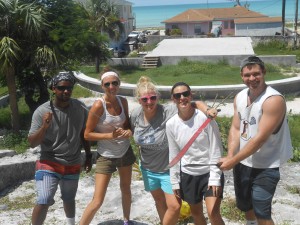 Our Gap Year crew has been very busy in their first month here at CEI with marine research, road trips, classes and community service. We’ve studied human ecology, coral reefs, mangroves and more. We analyzed sustainable aspects of our Island School/CEI community here and compared them to our home communities with the ultimate goal of designing a solution to an issue of sustainability at home.
Our Gap Year crew has been very busy in their first month here at CEI with marine research, road trips, classes and community service. We’ve studied human ecology, coral reefs, mangroves and more. We analyzed sustainable aspects of our Island School/CEI community here and compared them to our home communities with the ultimate goal of designing a solution to an issue of sustainability at home.
Outside of our classes, we’ve helped out with many on-site research projects studying everything from green sea turtles to Caribbean sharks to a local favorite, queen conch. We’ve also conducted plastic surveys and helped out in our permaculture garden. Last week we explored outside our immediate community and volunteered at the Tarpum Bay Arts & Cultural center doing a landscaping project (https://www.facebook.com/pages/Eleutheras-Art-and-Cultural-Centre/234550843232729). There we met the lovely director, Audrey Carey, who regaled us with stories about what life was like when she grew up in the Bahamas (very sustainable!) and showed us the local students’ and artists’ work. Continue reading
Meet our Fall Gap Year Students
Here are short bios from our three Gap Year students:
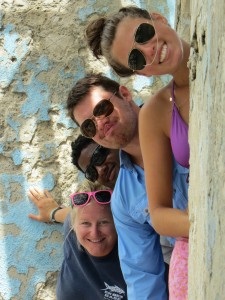 Eryn Dioli: My name is Eryn Dioli and I just graduated from high school in June of 2013. I’m taking a gap year before I start college, and in the fall of 2014 I will be attending The University of Colorado at Boulder where I hope to study international relations. I was drawn to CEI because of the way sustainable living is so much a part of life here. I have grown up on the ocean and it’s a great experience to be living in a place that is so dedicated to conserving it. I’m looking forward to learning more about permaculture and how I can implement that in to my own community at home, and to take part in the turtle research project. Continue reading
Eryn Dioli: My name is Eryn Dioli and I just graduated from high school in June of 2013. I’m taking a gap year before I start college, and in the fall of 2014 I will be attending The University of Colorado at Boulder where I hope to study international relations. I was drawn to CEI because of the way sustainable living is so much a part of life here. I have grown up on the ocean and it’s a great experience to be living in a place that is so dedicated to conserving it. I’m looking forward to learning more about permaculture and how I can implement that in to my own community at home, and to take part in the turtle research project. Continue reading
A Spotlight on CEI’s new Research Assistants
Here are brief bios from CEI’s three fall research assistants:
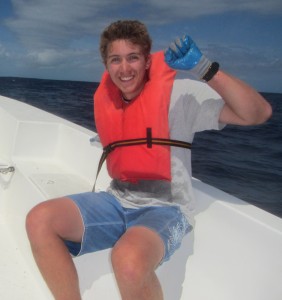 Ian Bouyoucos graduated from the University of Michigan with a degree in ecology and evolutionary biology. This research assistant position is his third time at CEI, following an internship in the summer 2010 and spring 2013 semesters. Ian’s research background is focused on shark stress physiology, as well as sturgeon bycatch reduction. Specifically, he has conducted research concerned with the secondary stress response in the smooth dogfish, and the potential for electropositive metals to serve as a method of bycatch reduction for Atlantic sturgeon. In addition, he has assisted on projects dealing with nursery habitat use of juvenile lemon and blacktip sharks, and bycatch reduction in sandbar sharks. On top of the research he will be involved in with the shark research and conservation program, Ian will be conducting a project focused on the immunological response in yellow stingrays to a chronic stressor, which will serve as a model for sharks. Continue reading
Ian Bouyoucos graduated from the University of Michigan with a degree in ecology and evolutionary biology. This research assistant position is his third time at CEI, following an internship in the summer 2010 and spring 2013 semesters. Ian’s research background is focused on shark stress physiology, as well as sturgeon bycatch reduction. Specifically, he has conducted research concerned with the secondary stress response in the smooth dogfish, and the potential for electropositive metals to serve as a method of bycatch reduction for Atlantic sturgeon. In addition, he has assisted on projects dealing with nursery habitat use of juvenile lemon and blacktip sharks, and bycatch reduction in sandbar sharks. On top of the research he will be involved in with the shark research and conservation program, Ian will be conducting a project focused on the immunological response in yellow stingrays to a chronic stressor, which will serve as a model for sharks. Continue reading
Students come to CEI to participate in Sharks, Flats, and Turtles Week
Students from the US and Puerto Rico came to the CEI campus for a week of working with researchers in the Shark, Flats, and Turtle Programs. Here is an update from each group.
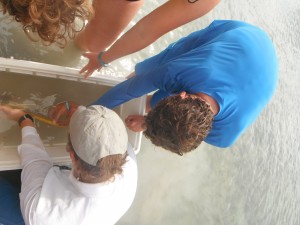
Flats Team: Campers working the with flats team got a crash course in learning about flats ecology, mangrove ecosystems, and the economic and ecological importance of one target flats species, the bonefish. They gained experience seining, where they caught bonefish and lemon sharks and were able to practice tagging and releasing. Campers also got to try their hand at fly fishing on the flats, and each group caught a few bonefish. Continue reading
Abaco Flats Program – a joint effort between CEI and Friends of the Environment
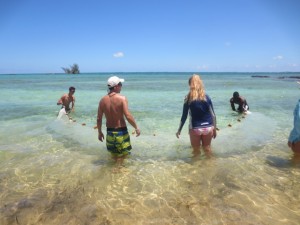 The program started out on Tuesday, August 13th, with an informational presentation on bonefish and flats ecology. Zack and Justin also spent a bit of time that first day teaching students the basics on flyfishing where they had the chance to practice casting, some of them for the first time! That afternoon we headed over to Great Cistern to do an introduction on methodology and how to use the seine net. We saw lots of turtles, a shark, and caught some shad (mojarra), crabs, shrimp, and other fun stuff in the seine net.
The program started out on Tuesday, August 13th, with an informational presentation on bonefish and flats ecology. Zack and Justin also spent a bit of time that first day teaching students the basics on flyfishing where they had the chance to practice casting, some of them for the first time! That afternoon we headed over to Great Cistern to do an introduction on methodology and how to use the seine net. We saw lots of turtles, a shark, and caught some shad (mojarra), crabs, shrimp, and other fun stuff in the seine net.
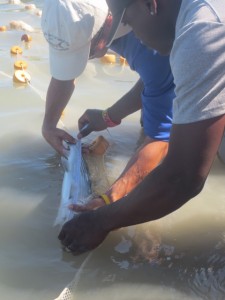
The second day we tagged 20 bonefish around Crossing Rocks, about 12 miles south of the Marls. Clint Kemp from Black Fly Lodge in Schooner Bay took us out with two of their flats boats for a beautiful day on the water. After tagging and doing a little fishing, he took us over to the Black Fly Lodge to check out their facilities. It was very quaint and personal lodge, right on the newly developed Schooner Bay. Clint provided a wealth of information on not only what it’s like to be a top notch fly fishing guide, but also some of the background on the development of the unique “Live, work, and play” community of Schooner Bay.
Check out their website:
Black Fly Lodge - http://www.blackflylodge.com/
Schooner Bay - http://www.schoonerbaybahamas.com/
Camden Hills returns for their fourth year joined by Oceanside and Medomak
This blog was written by the 18 incredible students visiting us from Maine.
Campus Life
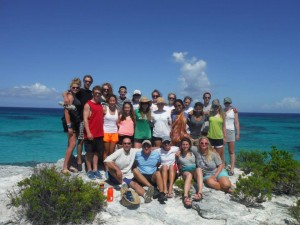
The Island School/CEI is located in Cape Eleuthera. The campus faces the water with exotic beaches and fish-filled boat launches as a part of its grounds. Everything about the campus is energy efficient, from its compost at meals to their homemade biodiesel for the vans. The food waste is fed to the pigs on campus and the rest is composted and used for their gardens. The gardens are then used for meals creating the basis of permaculture. We’ve already become aware of the energy we waste every day and can’t wait to put our new energy efficient methods to use at home.
Research
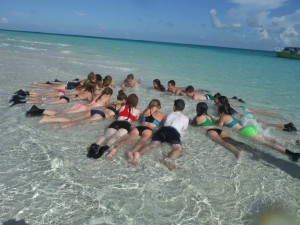
A big part of our experience here on Eleuthera has been conducting research through the Cape Eleuthera Institute (CEI). Our Camden Hills students have been split into three different research groups, led by CEI researchers: conch, bonefish (field), and another bonefish team (lab). The Oceanside-Medomak students are studying patch reefs, and the effects of their complexity on the abundance of fish. All four groups will be presenting their findings to an audience of peers, interns, researchers, graduate students, and staff next week. Continue reading
Space 2 Explore Camp teaches Eleutheran youth about marine conservation
Space 2 Create, a non profit summer day camp for the youth of Harbour Island, Eleuthera, joined forces with The Cape Eleuthera Institute to initiate Space 2 Explore, a program based around marine ecology and conservation. Founded in 2007 by William Simmons (DCMS Teacher), this comprehensive youth development program aims to enhance the academic, artistic and character development of young people on Harbour Island. Students this summer explored diverse marine habitats under the guidance of Cape Eleuthera Institute researcher Kristal Ambrose and DCMS teacher Carola Walker in partnership with divemaster Shawn Springer.
Students’ eyes were opened as they learned to identify countless organisms in the habitats they explored and also grasped the importance of these threatened ecosystems. These activities were not only academically enriching but helped students to build character as they faced their fears and accomplished things they never thought possible. This learning experience is highly relevant, as Harbour Island is experiencing the pressures of rapid development. It is important that the next generation understands the role of conservation in sustainable development.
Check out this video of their experience:
http://www.youtube.com/watch?v=aP4Jq-ARndE&feature=youtu.be